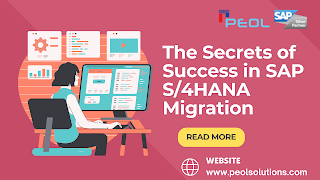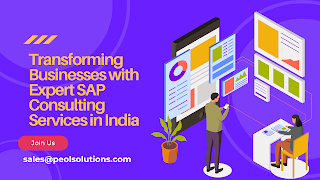The Future of SAP Consulting: Innovations Reshaping Business Technology
Introduction
1. The Rise of Intelligent ERP Systems
The adoption of intelligent ERP solutions like SAP S/4HANA has revolutionized how organizations operate. Unlike traditional ERP systems, S/4HANA runs on an in-memory database, allowing real-time processing and advanced analytics. Businesses can now make faster decisions, automate complex workflows, and gain predictive insights. SAP consulting is shifting toward helping enterprises build data-driven ecosystems, enabling them to respond quickly to market demands. Consultants are increasingly focusing on business process redesign, automation strategies, and integration with AI and IoT technologies.
2. Increased Adoption of Cloud-Based SAP Solutions
The global movement toward cloud computing has transformed SAP’s product landscape. Companies now prefer cloud-based SAP solutions because they offer scalability, cost efficiency, faster deployment, and continuous innovation. SAP consulting firms are moving away from traditional on-premise implementations and focusing more on guiding clients towards:
SAP S/4HANA Cloud
SAP Business Technology Platform (BTP)
SAP SuccessFactors
SAP Ariba and supply chain cloud suites
Cloud-driven consulting services also emphasize cybersecurity, compliance, and multi-cloud integration as businesses embrace hybrid IT environments.
3. AI, Machine Learning & Predictive Automation
AI and machine learning have become core components of modern SAP systems. SAP consultants now integrate intelligent features that automate repetitive tasks, reduce manual errors, and improve decision-making.
Examples include:
Predictive maintenance for manufacturing
AI-powered financial forecasts
Intelligent approval workflows
Automated payroll and HR analytics
4. Low-Code/No-Code Development in SAP
The future of SAP consulting will be heavily influenced by low-code and no-code development, especially through the SAP Business Technology Platform. This innovation empowers businesses to build custom applications, automate processes, and extend SAP solutions without deep technical expertise.
Consultants play a vital role in:
Setting up BTP environments
Training business users
Creating reusable workflows
Integrating SAP and non-SAP applications
This shift significantly reduces implementation times and fosters agility across organizations.
5. Focus on Industry-Specific SAP Solutions
SAP has expanded its portfolio of industry-specific solutions, including:
SAP for Retail
SAP for Healthcare
SAP for Manufacturing and Industry 4.0
SAP for BFSI
SAP for Oil & Gas
SAP consulting will increasingly revolve around domain-specific expertise, helping clients adopt pre-configured solutions tailored to their industry. Consultants will become strategic partners who understand both business processes and technology.
6. Improved Role of SAP Partners and Ecosystem Integration
The SAP ecosystem is rapidly expanding, and businesses now rely heavily on SAP Partners for implementation, support, and custom development.
Future SAP consulting will emphasize:
End-to-end digital transformation
System integration with third-party tools
Continual optimization through AMS (Application Management Services)
Custom development to meet unique business needs
Strong partner ecosystems ensure faster delivery, innovation, and long-term operational excellence.
7. SAP S/4HANA Migration Will Take Center Stage
As SAP phases out traditional ECC systems, businesses worldwide are accelerating their move to SAP S/4HANA.
Future consulting efforts will focus on:
Brownfield, Greenfield, and Hybrid migration strategies
Data cleansing and preparation
Process re-engineering
Custom code adaptation
Cloud migration planning
Organizations that migrate early will enjoy a competitive advantage through intelligent automation and real-time insights.
8. Automation & RPA Transforming SAP Processes
Robotic Process Automation (RPA) is reshaping SAP operations by reducing manual tasks and increasing consistency. SAP consultants now work closely with automation platforms to streamline tasks such as:
Invoice processing
Inventory updates
Purchase order creation
HR validations
RPA combined with SAP systems boosts productivity and reduces operational costs.
9. Greater focus on User Experience (UX)
SAP Fiori has set a new standard for user interface design. Modern SAP consulting includes UX improvements to help employees work more efficiently and intuitively.
Future innovations in SAP UX may involve:
Voice-enabled SAP applications
Augmented reality for field operations
Personalized dashboards
Mobile-first workflows
Consultants play a major role in designing UX that aligns with employee needs and business goals.
10. Real-Time Analytics & Data-Driven Decision Making
As companies gather more data than ever before, the need for real-time analytics continues to grow. SAP Analytics Cloud (SAC) is a major tool enabling businesses to extract meaningful insights for rapid decision-making.
SAP consultants now integrate SAC with:
Finance modules
Supply chain modules
Operational dashboards
Predictive tools
Analytics-driven consulting is the future as businesses strive for transparency, forecasting accuracy, and competitive advantage.
Conclusion
The future of SAP consulting is dynamic, intelligent, and innovation-driven. From cloud adoption and AI-powered automation to SAP S/4HANA Migration and industry-specific solutions, the SAP ecosystem is transforming how businesses operate globally. Companies looking to stay ahead must partner with the right experts who understand emerging technologies and modern enterprise needs.
For More Details:
Call: +91-8040905243
Mail: sales@peolsolutions.com
Visit: www.peolsolutions.com




Comments
Post a Comment